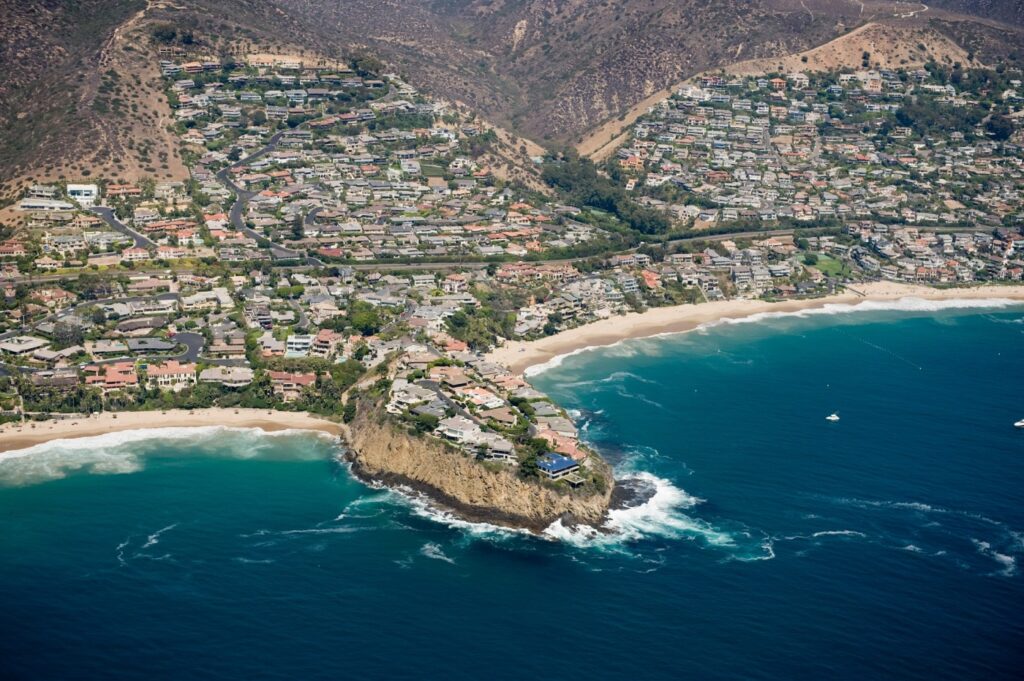
In November, Laguna Beach voters will decide if the public should have a greater say in larger developments that could be built in prominent locations in the seaside town.
If passed by voters, the initiative would apply to developments in the city along Coast Highway and Laguna Canyon Road, triggering a public vote when certain thresholds for size, parking and traffic are met.
Political action committee Laguna Residents First collected more than 2,000 signatures – 10% of registered voters are required – to place the measure on the ballot. The City Council could have decided to instead just adopt the new law.
Laguna Residents First wants more resident input on new, larger-scale development proposals, saying the additional traffic and parking issues they can cause impacts the community and the unique look of the town. It has been working on developing the initiative since 2020.
“Due to the natural limitation of the city’s size, proximity to the beach, the level of developments dictates the need for careful management of further intensification of land use in the city,” the initiative states. “The look and feel of Laguna Beach, including the rural and eclectic Laguna Canyon, walkable commercial districts, tree-lined streets and a variety of low-scale buildings require protection.”
Triggering a public vote before a development approved by city leaders could proceed would be proposals for projects that combine lots totaling more than 7,500 square feet, add at least 200 additional vehicle trips per day, exceed 36 feet in height or are more than 22,000 square feet in floor size. Only one of those elements would require the project appear on a ballot.
The initiative excludes single-family homes and projects that exclusively add fewer than 10 market-rate units or are limited to low- to extremely low-income households.
Gene Felder, one of the three residents to file the initiative, said among the key concerns are that some larger developments have been approved without enough parking. City leaders have allowed developers to pay parking-in lieu fees instead, and then haven’t even collected that money, he said.
“The Heisler building, by city standards, is to provide 170 parking spaces and they provide zero,” Felder said. “The city has a parking-in-lieu fee of $23,000 (a space), but they never collect it.”
In that case, the city gave the developer parking credits as an incentive because they undertook a historic restoration of the building. Felder said the initiative could discourage such arrangements or require a public vote.
Some council members said they feared while the initiative may be well-intended, it could add a “greater layer of bureaucracy” to the building process, that it could be seen as a “scare tactic” and that it could dissuade the development of entertainment and fine dining establishments. The council directed city staffers to look at a competing ballot measure that might find other ways to address residents’ concerns about scale, height and parking.
“People are concerned we’ll have monolithic developments,” Mayor Sue Kempf said. “The municipal code and the City Council don’t support that type of development. Maybe we can come back with something more palatable.”
Kempf pointed to Zinc Cafe, a restaurant on Ocean Avenue that added outdoor seating because of the impacts of COVID-19. If the restaurant were to make that permanent, Kempf worried because it’s an intensification of use it could be subject to the public vote and to parking-in-lieu fees.
Newport Beach, Costa Mesa and Dana Point have all added “greenlight laws” that force a resident vote on projects that exceed identified thresholds.
But Kempf said these laws can have “unintended consequences.”
For example, she said Costa Mesa will struggle to meet state housing requirements because of a public vote measure passed in 2016.
Since 2016, only one larger-scale development has been proposed in town, which some attribute to the required public vote scaring away new projects. A special election for the public vote on the proposal – which the council has approved – hasn’t been scheduled yet.
Felder said the ballot initiative could be a way for the city and developers to ensure projects being proposed meet the requirements – and would be palatable to residents – before they even go through city planning and design processes.
“You never want to tie up land use” Kempf said, “when you don’t know what’s going on in the future.”
Related Articles
Anaheim Convention Center hosts biggest event since early 2020
Why a giant refrigerator room made the difference for Second Harvest Food Bank
Orange County Board of Education wins lawsuit that challenged Trustee Tim Shaw’s appointment
HHS Secretary Becerra visits Orange County to talk mental health
It’s a golden year for CSUF’s Latinx Community Resource Center
